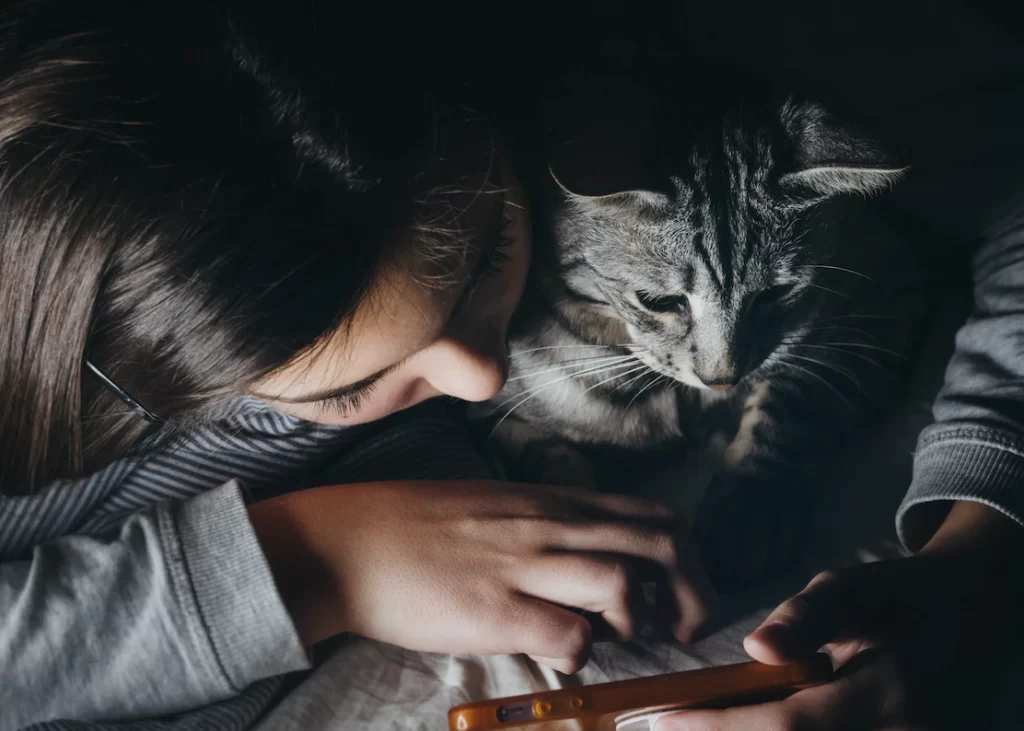Last updated on March 6th, 2023 at 01:44 am

Like people, our cats can also experience stress and the need to relax. It will be a bit absurd to think at first, especially if you are a first-time pet owner. How can a cat be stressed if they are just sleeping and eating all day? Remember, there are other factors that can develop stress in your cats, so yes, it is very possible for your cats to experience stress. So, with that saying, how to destress your cat?
There are tons of ways you can help to destress your cat. But of course, the most effective way is to not let them feel stressed at all. Prevention is better than cure, right? In this article, we will discuss how you can help to remove stress from your cat and how to prevent it from happening.
Do Cats Feel Stress?
As we all know, cats are very sensitive animals. They don’t usually react very calmly when it comes to changes. They love routines and they will always do, so a few changes, even the smallest ones can cause a great deal of stress for your feline companion. However, since cats are very good when it comes to concealing their feelings, sometimes, cat owners won’t even notice that cats are already feeling stressed.
According to Gary M. Landsberg DVM, cat owners, as well as vets, usually rely on behavioral changes when diagnosing stress. For example, do you notice that your cat is starting to scratch off your furniture, avoid eating, or sometimes like to be alone more frequently than usual? If you are, then your cat might start to feel a bit stressed, and it should end immediately. Stress can also come from medical conditions. Pain and other discomforts can be very stressful to cats. Changes in their bodies can make them feel more tired and stressed. It is important to identify the cause of stress in order to help reduce it. For example, if a new pet is introduced, it is important to provide plenty of hiding areas so the cat can feel safe.
Symptoms of Stress
As we mentioned, cats can display different behaviors that they don’t usually do when they are stressed. As a fur parent, you should be mindful of how your cat reacts. Afterall, you are the only person who can tell whenever your cat is acting differently. Here are some changes that cats usually exhibit when they are feeling anxious and stressed.
- Changes in Urination and Defecation Habits: Cats may urinate or defecate in places other than the litter box when they are feeling stressed.
- Ears are frequently flattened or turned backwards.
- Skin ripples or twitches down the back, especially after touching.
- Spraying or marking with urine.
- Aggressive behavior against you, other people, or other family pets.
- More hiding or, alternatively, more clinging.
- Overgrooming causes bald patches or rashes.
- Symptoms in cats with persistent health problems, such as upper respiratory viruses or urinary tract infections.
- They’re eating things they shouldn’t.
- Vomiting and/or diarrhea.
- Changes in Sleep Patterns: Stress can cause cats to either sleep more or less than they usually do.
- Loss of Weight: Cats that are stressed may lose weight due to decreased appetite and changes in their activity levels.
- Excessive Vocalization: Excessive meowing or yowling can be a sign of stress in cats.
- Acts jumpy, with dilated eyes, a stiff, hunched posture, and puffed-out fur.
- Pacing.
- Hiding: Cats may hide in places they usually don’t go, or they may try to escape the home or stay in their hiding spot for long periods of time.
If you notice any behavioral changes happening to your cat, contact your vet immediately to eliminate all possible medical conditions. Stress is usually a sign of something more serious, so please don’t take it lightly. There are a lot of ways you can help your cat, but eliminating possible illness should be your top priority.
What Causes Stress in Cats?
Like in people, stress can come from a lot of things. It can be physical, psychological, or medical. As a fur parents, it’s our duty and responsibility to make sure that our cats are happily living with us. We should eliminate everything that causes stress, but what are they?
- Environmental factors: Loud noises such as fireworks, construction and traffic can cause anxiety in cats. Moving to a new home or having a change in routine can also be stressful for cats. Having too many cats in the same house can also cause stress, as cats are territorial and can become anxious when their space is invaded. Cats may also become stressed when exposed to unfamiliar animals, such as birds and other cats. Poor living conditions, such as a dirty, cramped living space, can also increase stress. Unfamiliar people or children can also cause cats stress, as cats are very sensitive to changes in their environment. If not managed properly, stress can lead to further health problems in cats.
- Psychological factors such as OCD or Alopecia can also stress your cat. Imagine having a brain that keeps telling you what to do and what not to do in a very unhealthy way, it’s the same concept with our cats. Finally, cats can become stressed if they are not receiving enough mental stimulation through play and interactive activities.
- Traume and other bad experiences.
- Any medical conditions can cause stress. Contact your vet immediately if this is the root cause.
- Too much attention. Cats aren’t like dogs, and sometimes, all they want is peace. If you are demanding too much attention or giving them too much of it, it can cause stress.
- Change in diet. Not all cat food will agree with your cat, a few of them can cause stomach aches and other draining conditions.
As you can see, there are a lot of factors that can be very stressful for your cats. What you can do is avoid giving them anything that can induce stress and start providing them things that can make them happier. Remember, a happy cat means a happy life.
How to Destress Your Cat?
Now that we know what might cause them, let’s take it a bit deeper and see what we can do to destress them and what else we can do to help them. Here is some step-by-step procedures that you should consider taking.
- Reduce Exposure to Stressful Environments. When cats are exposed to loud noises, unfamiliar animals, or other stressful situations, they can become overwhelmed and anxious. Try to reduce their exposure to these types of environments. If you have to take your cat outside, make sure it is in a secure environment and keep them away from other animals.
- Massage Your Cat. A simple massage can give satisfaction to your cat. It can give them happiness and possibly destress them. Consider giving them a full massage but make sure that they also like the idea of massage, not all cats like it.
- Spend Quality Time With Your Cat. Spending quality time with your cat is a great way to reduce their stress levels. Spend time playing with them, petting them, and simply being around them. This will help them build trust and bond with you, which can help to lower their stress levels.
- Scratchers Can Help. Scratchers aren’t just for claws anymore, it can also help your cat to relieve all tension that’s been bothering their body. Aside from toys, this can also help your cat with stress. Make sure that you have scratchers!
- Create A Safe Space – Create a safe space for your cat, such as a quiet bedroom or a corner of the house, where they can go to relax and unwind. Make sure to provide plenty of comfortable bedding, cozy blankets and toys for them to enjoy. You should also make sure to keep the space away from noisy areas and any other pets in the household.
There are a lot of ways to help your cat, but you must first find the root cause and eliminate medical conditions. If it is a medical problem, make sure that you consult your vet for possible treatment. It can be small like fleas or worms, but it can also be fatal. The best thing to help them is to get them professional help. It may be a bit expensive but, you cannot put a price on your cat’s overall health.
Conclusion
Cats are amazing and smart animals that can figure out even the smallest changes happening. Therefore, destressing your cat is an important part of good cat care. The stress your cat experiences can lead to a number of health issues, so it is important to help them relax and feel safe. Ensure they have plenty of scratching posts, toys, and hiding spots. Additionally, provide them with plenty of mental and physical stimulation. Take them out for walks or play with them regularly.
Stress can also be a symptom of something more severe, so please consult your vet to eliminate the possibility of a medical condition. Cats are fun to be with, and we can return the favor by giving them everything they need. We are responsible for them, and we know that the moment we get them. We hoped that we answered your question on how to destress your cat and we also hope that you enjoyed reading the whole article. Remember, prevention is better than cure, so prevent anything that can stress them.


